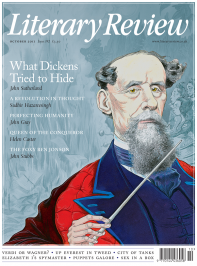Clare Clark
Slaves to Fortune
The Quality of Mercy
By Barry Unsworth
Hutchinson 294pp £18.99
On a cold night in 1767, thanks to an uncommon piece of luck, a convict destined for the gallows walks free from Newgate Prison. Almost immediately, in a second stroke of good fortune, he finds a drunken man, prostrate on the road, his purse heavy with coins. The scene that follows, as the convict takes first half and then almost all of the man’s money, and then returns a third time to relieve him of his coat and boots, all the while intent upon justifying his actions as only fair and reasonable, is a masterful piece of writing. Comic, touching and profound, it hurls the reader head first into the earthy, opportunistic eighteenth-century world of Tristram Shandy and Moll Flanders. It is also a pitch-perfect evocation of the moral flexibility of those set on financial gain.
Almost two decades after his novel Sacred Hunger famously shared the 1992 Booker Prize with Michael Ondaatje’s The English Patient, Barry Unsworth has published its sequel. Set on board an eighteenth-century slave ship, Sacred Hunger was an impassioned epic about the corrupting power of greed and the striving for profit ‘which justifies everything, sanctifies all purposes’. The book was a response to the unbridled materialism of Thatcherite Britain and the deification of wealth that has continued in the intervening years, through boom and bust, to define Western society. Little wonder, then, that The Quality of Mercy, which takes up the story of the mutinous crew two years later, marks a return not only to a number of the characters first encountered in Sacred Hunger but to its central themes.
Sullivan, the escaped convict of the opening chapter, is one of the sailors dragged back to England by Erasmus Kemp, the son of a bankrupted slave-ship owner, to face trial for piracy and murder. At the same time, in the civil courts, Kemp is endeavouring to extract compensation from his

Sign Up to our newsletter
Receive free articles, highlights from the archive, news, details of prizes, and much more.@Lit_Review
Follow Literary Review on Twitter
Twitter Feed
The era of dollar dominance might be coming to an end. But if not the dollar, which currency will be the backbone of the global economic system?
@HowardJDavies weighs up the alternatives.
Howard Davies - Greenbacks Down, First Editions Up
Howard Davies: Greenbacks Down, First Editions Up - Our Dollar, Your Problem: An Insider’s View of Seven Turbulent...
literaryreview.co.uk
Johannes Gutenberg cut corners at every turn when putting together his bible. How, then, did his creation achieve such renown?
@JosephHone_ investigates.
Joseph Hone - Start the Presses!
Joseph Hone: Start the Presses! - Johannes Gutenberg: A Biography in Books by Eric Marshall White
literaryreview.co.uk
Convinced of her own brilliance, Gertrude Stein wished to be ‘as popular as Gilbert and Sullivan’ and laboured tirelessly to ensure that her celebrity would outlive her.
@sophieolive examines the real Stein.
Sophie Oliver - The Once & Future Genius
Sophie Oliver: The Once & Future Genius - Gertrude Stein: An Afterlife by Francesca Wade
literaryreview.co.uk